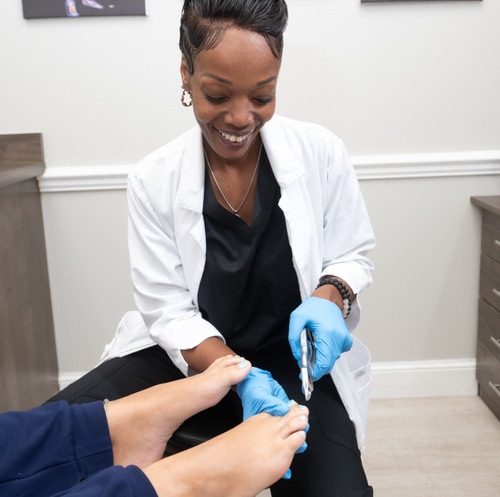
Did you know? Acute ankle sprains are the leading lower limb injury in athletes, accounting for 16% to 40% of all sports injuries.
When foot or ankle pain strikes, finding the right care quickly becomes a priority. Certified foot and ankle specialists are medical doctors with special training to treat problems affecting these complex body parts.
These board-certified podiatrists offer specialized treatments for everything from plantar fasciitis and bunions to sports injuries and diabetic foot care.
Looking for expert foot care isn’t just about relief and preventing future issues. When needed, podiatrists near you can provide custom orthotics, laser treatments for toenail fungus, and surgical options.
Many foot problems worsen without proper treatment, so seeing a specialist is important rather than trying to manage pain alone.
These professionals treat patients of all ages and can address both common and complex foot conditions.
Key Takeaways
- Board-certified podiatrists provide specialized diagnosis and treatment for all foot and ankle conditions, from common issues to complex problems.
- Early intervention from a foot specialist can prevent worsening pain and complications. The specialist offers both surgical and non-surgical treatment options.
- Finding qualified foot and ankle specialists near you ensures convenient access to expert care that can improve your mobility and quality of life.
Who Is A Certified Foot & Ankle Specialist?
Certified foot and ankle specialists are medical professionals with extensive training in diagnosing and treating conditions affecting the lower extremities.
These experts have the knowledge and skills to provide comprehensive care, from common foot pain to complex surgical reconstructions.
Qualifications And Certifications To Look For
A qualified foot and ankle specialist typically holds a Doctor of Podiatric Medicine (DPM) degree from an accredited podiatric medical school. This involves four years of specialized education after completing undergraduate studies.
After medical school, these doctors complete a 2 to 3 year residency program, during which they receive hands-on training in foot and ankle medicine and surgery.
Many specialists are board-certified, which means they’ve passed rigorous exams demonstrating their expertise.
Look for credentials such as:
- Board certification by the American Board of Foot and Ankle Surgery
- Fellowship training in specialized areas
- Membership in professional organizations like the American Podiatric Medical Association
- State licenses and hospital privileges
These credentials ensure your specialist has met high standards for providing quality foot and ankle care.
The Difference Between A Podiatrist And An Orthopedic Specialist
| Criteria | Podiatrists | Orthopedic Foot & Ankle Specialists |
| Education & Training | Complete podiatric medical school with a focus on lower extremity care. | Medical doctors (MDs) or doctors of osteopathy (DOs) with orthopedic surgery residency and optional foot/ankle fellowship. |
| Specialization | Specialized exclusively in foot, ankle, and related structures. | Broader musculoskeletal training with a focus on foot and ankle. |
| Approach to Care | Often emphasize conservative treatments and common foot conditions. | May integrate broader orthopedic and surgical knowledge. |
| Care Settings | Often found in practices like Foot and Ankle Clinics. | Commonly part of practices such as Twin Cities Orthopedics. |
| Comprehensive Care | Collaborate with orthopedic specialists in multi-disciplinary clinics. | Work alongside podiatrists for well-rounded treatment options. |
Why Certification Matters In Foot & Ankle Care
Certification ensures your foot and ankle specialist has met rigorous standards for knowledge, skill, and patient care.
Board-certified specialists must pass comprehensive exams and maintain their certification through continuing education.
This matters because foot and ankle problems can be complex. A certified specialist has demonstrated expertise in properly diagnosing conditions and providing appropriate treatments, from conservative approaches to advanced surgical techniques.
Certified specialists stay current with the latest medical advancements. They’re trained to offer treatments ranging from custom orthotics to minimally invasive procedures to complex reconstructive surgery.
When you choose a certified specialist, you can feel confident you’re receiving care from someone who has proven dedication to excellence in foot and ankle medicine.
Why limp through life when you can stride with confidence? Our certified foot and ankle specialists at the Foot, Ankle & Leg Vein Center deliver expert care that keeps you moving. Book your appointment today because every step matters!
Common Conditions Treated By Certified Foot & Ankle Specialists
Certified specialists treat various foot and ankle issues using advanced techniques and personalized care plans.
Your comfort and mobility are their top priorities when addressing these common but often debilitating conditions.
Foot Conditions Treated By Specialists
Podiatrists regularly treat plantar fasciitis, which causes intense heel pain, particularly in the morning. This condition responds well to custom orthotics, stretching exercises, and occasionally, cortisone injections.
Bunions appear as painful bumps at the base of the big toe and can worsen without proper treatment. In severe cases, specialists may recommend special footwear, padding, or surgical correction.
Diabetic foot care is a crucial specialty, as diabetes can lead to serious foot complications. Regular check-ups with a specialist are essential to prevent ulcers and infections.
Ingrown toenails, fungal infections, and corns/calluses are common issues that specialists address with both immediate relief and preventative strategies.
Ankle Issues That Require Expert Attention
Proper evaluation and treatment of ankle sprains are necessary to prevent chronic instability. Your specialist will assess the severity of your injury and design a rehabilitation program.
Achilles tendon problems include tendinitis and ruptures that can severely impact your mobility. Board-certified specialists in Tucson provide comprehensive exams and treatment plans tailored to your activity level and healing needs.
Ankle arthritis causes joint pain and stiffness that worsens over time. Treatment options range from bracing and anti-inflammatory medications to advanced surgical procedures that restore function and relieve pain.
Ankle fractures vary in severity and complexity. Your specialist will use imaging techniques to determine the exact nature of the fracture and whether surgical intervention is necessary.
Leg Vein Problems And Treatment Options
Varicose veins appear as swollen, twisted veins near the surface of the skin. They often cause discomfort and cosmetic concerns. Modern treatments include minimally invasive procedures that can be performed in the office.
Spider veins, while smaller than varicose veins, can cause similar discomfort. Specialists use sclerotherapy and laser treatments to effectively reduce their appearance.
Deep vein thrombosis (DVT) is a serious condition requiring immediate attention. Your foot and ankle specialist will coordinate with vascular specialists to ensure proper care.
Chronic venous insufficiency causes poor blood flow, which can lead to swelling and skin changes.
Treatment focuses on improving circulation through compression therapy, exercise recommendations, and, in some cases, surgical intervention.
What To Expect During A Visit To A Certified Foot & Ankle Specialist
Visiting a foot specialist involves a structured approach to diagnosing your condition and developing an effective treatment plan. The process is designed to address your specific foot or ankle concerns with expert care.
Initial Consultation And Diagnostic Process
Your first appointment with a foot doctor will begin with a comprehensive medical history review. The specialist will ask about your symptoms, when they started, and what makes them better or worse.
Be prepared to remove your shoes for a thorough examination of your feet. Wear comfortable footwear that’s easy to take off and put back on.
The podiatrist will observe your walk and stand to assess your gait and posture. This will help identify issues that might not be apparent when you’re sitting.
Diagnostic tests may include:
- X-rays (often performed in the office)
- Blood tests
- MRI or CT scans if needed
- Nerve conduction studies
Your doctor will explain their findings in clear terms and answer any questions you have about your condition.
Personalized Treatment Plans For Every Patient
After diagnosis, your foot specialist will develop a treatment plan tailored to your needs. This plan considers your age, activity level, and the severity of your condition.
Treatment options might include:
- Conservative approaches: Custom orthotics, bracing, or specialized footwear
- Medication: Anti-inflammatories or other prescription drugs
- Injections: For pain relief or to promote healing
- Physical therapy: To improve strength and mobility
- Minimally invasive procedures: For certain conditions
- Surgery: When necessary for optimal outcomes
Your podiatrist will explain all options and help you understand the benefits and risks of each approach. They will also consider your lifestyle and goals when recommending treatment.
You’ll receive instructions on at-home care to support your recovery and prevent future problems.
Follow-Up Care And Long-Term Foot Health
Regular follow-up appointments are essential to monitor your progress and adjust treatments as needed. Your doctor will track your healing and adjust your plan based on your response.
Podiatrists often provide education on preventing future foot problems. This might include advice on:
- Proper footwear selection
- Foot hygiene practices
- Exercise recommendations
- Warning signs to watch for
For chronic conditions like diabetes, your specialist may recommend periodic check-ups even when you’re feeling fine. These preventive visits can catch issues before they become serious.
Many podiatrists collaborate with other healthcare professionals to provide comprehensive care. Depending on your needs, this team might include physical therapists, orthopedic surgeons, or diabetes specialists.
Stop ignoring your nagging foot pain! The certified pros at the Foot, Ankle & Leg Vein Center offer real solutions to ankle and foot issues. Get relief—schedule your visit now to get relief.
How To Find The Best ‘Certified Foot & Ankle Specialists Near Me’
Finding the right foot and ankle specialist can significantly affect your treatment outcomes. The search process involves examining credentials, reading reviews, and preparing the right questions for your initial consultation.
Key Factors To Consider When Choosing A Specialist
When searching for certified foot and ankle specialists near you, location should be a primary consideration. Choose someone with a convenient office, as you may need multiple visits during treatment.
Experience matters greatly. Look for specialists who regularly treat your specific condition, whether it’s bunions, plantar fasciitis, or diabetic foot issues. Specialists with extensive experience tend to have better outcomes.
Insurance coverage is another crucial factor. Before scheduling an appointment, verify that the specialist accepts your insurance plan to avoid unexpected costs.
Consider the specialist’s hospital affiliations. The best foot and ankle doctors typically have privileges at reputable medical facilities. This becomes important if you need surgical intervention.
Communication style should not be overlooked. You want a doctor who listens carefully, explains things clearly, and respects your input in treatment decisions.
The Importance Of Checking Credentials And Reviews
Your first credential check should be board certification. Legitimate foot and ankle specialists will have certification from recognized medical boards, such as the American Board of Podiatric Medicine.
Verify their education and training background. Quality specialists typically complete a Doctor of Podiatric Medicine (DPM) degree followed by a residency program focused on foot and ankle care.
Look for professional memberships in organizations like the American Podiatric Medical Association, which indicates a commitment to professional standards.
Pay attention to reviews that mention specific treatments and outcomes rather than just general impressions.
Note how the specialist handles negative reviews—respectful responses indicate professionalism.
Questions To Ask Before Booking An Appointment
Experience questions:
- How many patients with my condition have you treated?
- What is your success rate with this particular treatment?
- How frequently do you perform this procedure?
Treatment approach questions:
- What treatment options are available for my condition?
- What are the potential risks and benefits of each option?
- Do you typically try conservative treatments before suggesting surgery?
Ask about recovery expectations: “How long might recovery take, and what limitations should I anticipate during that time?”
Inquire about follow-up care protocols. Understanding how the specialist monitors progress can give you confidence in their comprehensive approach.
Don’t hesitate to ask about the details of the costs and insurance coverage. A good foot and ankle center will have staff who can clearly explain the financial aspects of your treatment plan.
Treatment Options Provided By Certified Foot & Ankle Specialists
Certified podiatrists offer various treatments tailored to your specific foot and ankle conditions.
From conservative approaches to advanced surgical interventions, these specialists use evidence-based methods to ensure optimal outcomes for patients of all activity levels.
1- Conservative Care: Non-Surgical Treatments
When you visit a foot and ankle specialist, conservative treatment options are typically the first approach. These non-invasive methods often provide significant relief without surgery.
Common conservative treatments include:
- Custom orthotic devices to correct alignment issues and reduce pain
- Physical therapy protocols designed specifically for foot and ankle rehabilitation
- Medication management, including anti-inflammatories and pain relievers
- Corticosteroid injections for targeted inflammation reduction
- Stretching and strengthening exercises to improve function
For conditions like heel pain, your podiatrist might recommend specialized night splints or supportive footwear.
Diabetic patients receive comprehensive foot care, including regular examinations, wound care, and preventative strategies to avoid complications.
2- Advanced Surgical Procedures For Complex Cases
When conservative treatments don’t provide adequate relief, certified specialists offer surgical interventions ranging from minimally invasive techniques to complex reconstructive procedures.
Board-certified podiatrists are qualified to perform:
- Bunion correction surgery using the latest techniques for faster recovery
- Hammertoe repair to restore proper toe alignment and function
- Ankle arthroscopy for joint issues with smaller incisions and quicker healing
- Reconstructive surgery for severe deformities or traumatic injuries
- Nerve decompression for conditions like tarsal tunnel syndrome
Advanced imaging technology helps your specialist pinpoint exact problem areas before surgery. This precision approach means more targeted procedures and better outcomes.
Many surgical treatments can be outpatient, allowing you to return home the same day. Your specialist will create a customized rehabilitation plan to ensure proper healing and optimal function following any surgical intervention.
3- Specialty Services For Athletes And Active Individuals
Active people face unique foot and ankle challenges requiring specialized care. Athletes particularly benefit from treatments designed to minimize downtime while promoting complete healing.
Specialty services include:
Sports-Specific Treatments:
- Custom orthotics designed for specific sports activities
- Gait analysis to identify mechanical issues affecting performance
- Targeted rehabilitation protocols for rapid return to sports
- Preventative care strategies to avoid recurring injuries
Foot and ankle specialists who treat athletes often employ cutting-edge technologies, such as platelet-rich plasma (PRP) therapy and extracorporeal pulse activation technology (EPAT), to accelerate healing and reduce recovery time.
For runners experiencing foot pain, your specialist might recommend technique modifications alongside treatment.
Dancers with ankle injuries receive specialized protocols designed to preserve a range of motion and flexibility essential to their craft.
Many podiatrists now offer telemedicine follow-up appointments, making maintaining your treatment plan between office visits convenient.
Conclusion
When it comes to foot and ankle care, choosing a certified specialist makes all the difference.
Board certified providers ensure you receive the highest quality care from professionals who have proven their expertise.
Your feet deserve specialized attention from doctors who focus exclusively on foot and ankle conditions.
These experts have dedicated years to understanding the complex mechanics of your feet and ankles.
Finding the right specialist is simple. Look for trusted foot and ankle doctors who emphasize personalized treatment with clear communication and respect.
Many certified specialists offer comprehensive services, including custom orthotics, physical therapy, minimally invasive procedures, and advanced surgical options when necessary.
Don’t wait until foot pain becomes unbearable. Early intervention often leads to faster recovery and better outcomes.
Your feet deserve better. Our certified specialists at the Foot, Ankle, and Leg Vein Center know how to treat pain and keep you active. Contact us today to take the first step toward healthier feet!
Frequently Asked Questions
What Does a Certified Foot & Ankle Specialist Do?
A certified foot and ankle specialist diagnoses and treats conditions affecting the feet, ankles, and lower legs, offering treatments ranging from conservative care to advanced surgical procedures.
When Should I See a Foot & Ankle Specialist?
If you experience persistent pain, swelling, mobility issues, or injuries such as sprains, fractures, or heel pain that do not improve with home care, you should see a foot and ankle specialist.
What Conditions Can a Certified Foot & Ankle Specialist Treat?
Certified specialists use both non-surgical and surgical methods to treat conditions such as bunions, plantar fasciitis, Achilles tendonitis, ankle sprains, and diabetic foot problems.
How Do I Find a Certified Foot & Ankle Specialist Near Me?
To find a certified foot and ankle specialist near you, search for local podiatry clinics, check certifications (e.g., DPM, FACFAS), and read patient reviews for trusted treatment options.
What Should I Expect During My First Visit to a Foot Specialist?
During your first visit, the specialist will assess your symptoms, conduct physical exams, possibly recommend imaging tests, and discuss a personalized treatment plan to address your specific needs.
Can a Foot & Ankle Specialist Help with Sports Injuries?
Yes, a certified foot and ankle specialist can help treat sports injuries such as sprains, fractures, and tendonitis, offering immediate relief and long-term injury prevention strategies.
Does Insurance cover Certified Foot & Ankle Specialists?
Most health insurance plans cover treatment by a certified foot and ankle specialist, especially if the visit is medically necessary. Check with your insurance provider for specific coverage details.



